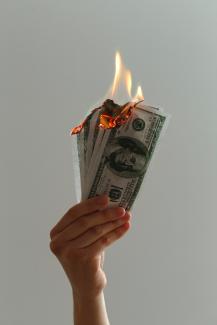
Got Debt?
According to the Federal Reserve Bank of New York, consumers now owe an average of $9888 on their credit cards, up 17% from the year prior of $5700 per person. In addition to this increase, the annual percentage rate (APR) is over 20% on average which is the highest it’s ever been since APRs began being tracked in 1994.
When daily expenses keep going up and up, what can you do? Inflation has shrunk our paychecks. It’s impossible to keep up with the same rate of spending when everything costs more. Which leads to the first suggestion to avoid putting your “normal” expenses on a credit card. These times are not normal, so you are going to have to adjust. We’ve all become used to our creature comforts and our daily routine, but hard times call for hard measures. Think back at how the lives of everyday American’s changed during the Depression of the 1930s or adjusting to the rations of WWII. Life had to change. Our spending and consumption habits also had to change. You simply can’t continue the same rate of spending when the costs of goods and services have increased 25% or more.
I’m always telling people that a budget is your first line of defense with your money. If you don’t know where your money is going, you likely find yourself short every month. Endless swipes of your debit or credit card is going to get you in a lot of trouble. Trust me, I’ve been there. A budget always seemed like a good idea or maybe you’ve gone so far as to create one, but you can’t seem to follow it. Start slow. List out your realistic monthly expenses. Go through previous months’ bank statements and list out every single thing you’ve spent money on. You’ll be surprised where your money is going. Google a budgeting template to create your first budget, or if you’re good with Excel, create one there. There are so many budgeting apps out there too. I love the Ramsey Every Dollar app. It’s hooked to my bank account, so I literally drag expenses into the appropriate category. I can’t tell you how budgeting like this changed my life. When you budget with intention, you’ll feel like you got a raise.
No one likes to do this, but you’re going to have to cut back. Maybe that means making your coffee at home or packing your lunch. I know that it’s easy to order Door Dash after a particularly hard day but try meal prepping on the weekend instead. That way you have something ready to pop in the oven or microwave. This was the hardest for me to adapt to as I LOVE the convenience of going out to eat. But my budget didn’t. It’s so easy to just swipe the debit or credit card on meals and over time it adds up and becomes a budget killer.
Do you like gardening? One of the best things you can do for yourself is to grow your own food. Build yourself a small garden. Not only will your budget like it, so will your body. This may sound extreme, but there are a lot of people who have turned to this. There are countless people on You Tube that explain how to start your first garden. While you’re searching You Tube, search for Depression era cooking channels. They show you how people cooked good cheap meals for their families through that difficult time.
Hopefully, your eyes haven’t glazed over reading my suggestions. I get it. We want more than our parents had or we are trying to keep up with friends and family. Or, better yet, I deserve it. I work hard. That may be true, but if you don’t want to retire broke, you must be intentional and change your habits. This applies to any economic climate but is even more important when our economy is near recession. You’d be surprised how many people are in the same situation. Try taking Dave Ramsey’s Financial Peace University. Start building a community of people that are trying to get out of debt and stay out of debt. I won’t lie, it’s hard work. But, with the increasing economic pressure, you can’t afford not to.

